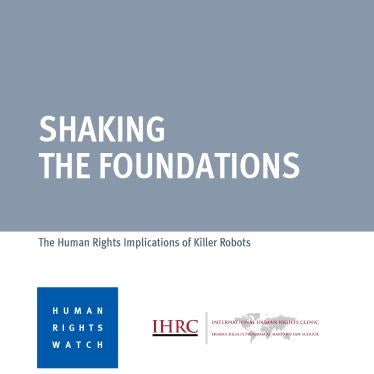Human Rights Watch urged President Clinton to keep the promise he made in 1994 to ban antipersonnel landmines by joining the 1997 Mine Ban Treaty.
"Clinton's Landmine Legacy," the new 42-page report from Human Rights Watch released today, details U.S. policy and practice on antipersonnel mines and recommends a dozen steps the president should take before leaving office.
The U.S. has said it will not join the Mine Ban Treaty until 2006, and then only if it has identified and fielded an alternative to the weapon. To date, 137 countries have joined the global ban on antipersonnel mines.
"President Clinton personally helped make the landmine crisis an issue of great international concern," said Stephen Goose, program director of the Arms Division at Human Rights Watch. "Instead of walking away from an issue we know he cares about deeply, President Clinton should submit the Mine Ban Treaty to the Senate." Goose urged Clinton to take executive actions to begin implementing a comprehensive ban, rather than waiting for the Senate to act.
The new Human Rights Watch report reveals for the first time that the U.S. has antipersonnel mines stockpiled in Qatar, which has already joined the treaty. The U.S. is also apparently planning to add to the stockpile in the near future.
Goose praised the Clinton administration for making more resources available for humanitarian mine action programs. But he said that the United States is in some respects moving away from a mine ban as President Clinton nears the end of his administration. Perhaps most disturbing, the Pentagon is developing so-called alternatives to antipersonnel mines that would in fact be illegal under the Mine Ban Treaty.
Some elements of President Clinton's landmine legacy:
--the U.S. is not among the 137 nations, including all of NATO except Turkey, that have signed the Mine Ban Treaty. Instead, the U.S. is keeping company with China, Russia, Iraq, Libya, North Korea, Burma and Cuba;
--the U.S. still insists on the right to use antipersonnel mines in joint military operations with NATO and other military allies that are party to the Mine Ban Treaty, which would put them at legal risk;
--the U.S. is one of just sixteen antipersonnel mine-producing nations left in the world;
-- the U.S. has the third or fourth largest stockpile of antipersonnel mines in the world, totaling more than 12 million;
-- the U.S. still maintains antipersonnel mine stockpiles in a number of countries that are party to the Mine Ban Treaty, including Germany, Japan, Norway, Qatar and the U.K.;
-- the Pentagon has plans to spend more than $820 million to develop alternatives to antipersonnel mines, but it is still very uncertain if the search will be successful at all, and it is increasingly clear that it will not be completed by 2006;
-- sometime in fiscal year 2001, the U.S. is to make a decision about producing, at a cost of $150 million, a new mine system called RADAM that contains antipersonnel mines and would be prohibited under the Mine Ban Treaty;
-- some in the Pentagon want to replace dumb (non-self-destructing) mines with a munition containing a "battlefield override"feature; this feature would revert the munition to dumb, indiscriminate status, and thus would be prohibited under the ban treaty. A production decision is expected in fiscal year 2002;
-- the Air Force apparently has new plans to begin stockpiling Gator antipersonnel mines in Qatar, a party to the Mine Ban Treaty;
-- the Air Force has plans to upgrade the dispensers carrying Gator antipersonnel mines in 2005, even though the stated objective is to have alternatives to Gator in place in 2006.
Among the Human Rights Watch recommendations are that President Clinton set a definitive deadline for joining the treaty, rather than a conditional objective of 2006, and that he declare a ban on production of antipersonnel mines.
Human Rights Watch, an international monitoring organization based in New York, is a founding member of the International Campaign to Ban Landmines, 1997 Nobel Peace Prize winner.






